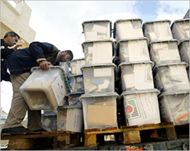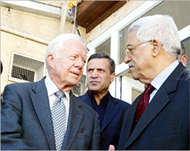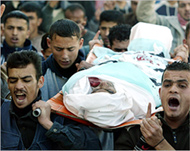Uraiqat: Israel not easing grip for poll
Palestinians have accused Israel of not carrying out a promised easing of its military grip on the West Bank and Gaza for a presidential election to pick Yasir Arafat’s successor.

On the eve of the vote, Palestinian officials announced a parliamentary election would be held on 17 July to complete what they hope will be a smooth transition towards democratic reform and peacemaking with Israel after the November death of Arafat.
As international election experts fanned out to monitor the ballot, Israeli soldiers kept up their daily routine, inspecting the identity cards and packages of Palestinians waiting in line at checkpoints at the entrances to West Bank cities.
“The Palestinians and their cars are being checked at the roadblocks. This is not what we call easing of restrictions,” Palestinian cabinet minister Saib Uraiqat said ahead of Sunday’s vote, which Mahmud Abbas, an advocate of non-violence in a struggle for statehood, was expected to win by a landslide.
Curfew
Hanna Nasir, chairman of the Palestinian Central Election Commission, said international monitors were urged to ensure Israel relaxed military restrictions in occupied territories.
“We have not received reports from observers in the field about problems at checkpoints. That does not mean there are no problems,” said a spokeswoman for European Union monitors.
 |
|
Palestinians say Israel has not |
“I can’t tell you (yet) that there have been no problems.”
Israeli forces slapped curfews on several villages outside Nablus in a hunt for resistance fighters who killed an off-duty soldier and wounded three in the northern West Bank on Friday.
The curfews initially prevented deliveries of ballot papers there, but the restrictions were later lifted and monitors said all election materials were distributed.
Checkpoints
In promising to help Palestinians hold their first presidential election since 1996, Israel said it would keep troops out of West Bank cities – where they often mount raids in search of resistance men – but checkpoints would remain.
To Palestinians, the checkpoints are detested symbols of occupation. Israel says they stop human bombers.
 |
|
Jimmy Carter (L) is one of the |
The Nablus-area attack drew an Israeli threat to rescind its pledge of no military operations.
“We (promised) to ease off for 72 hours under agreement with the Palestinians, so that their security forces would take over responsibilities for the relevant areas,” a senior Israeli security source said. “If they fail to make good on that, we will have no choice but to act.”
Political sources said former US President Jimmy Carter, one of the election monitors, was asked by an adviser to Prime Minister Ariel Sharon to deliver the warning to Abbas.
Al-Aqsa Martyrs Brigades, an armed group in Abbas’s dominant Fatah faction, claimed responsibility for the West Bank ambush.
More bloodshed
Veteran Israeli peacemaker Shimon Peres, who is taking his Labour Party into a new coalition government with Sharon to pursue a planned withdrawal from the small occupied territory if Gaza, said Israel would do its utmost to facilitate the ballot.
“It is in our interest as well as the Palestinians’,” he said.
The passing of Arafat has raised hopes of ending four years of Israeli-Palestinian bloodshed and reviving peace negotiations aimed at a Palestinian state. The United States and Israel accused him of fomenting violence, something he always denied.
 |
|
Bloodshed is ongoing on the eve |
But resistance fighters have spurned Abbas’s calls for a truce, suggesting he will have an uphill battle to realise his agenda.
New violence flared in the Gaza Strip as Israeli soldiers shot dead a 60-year-old Palestinian in a car at a junction near an army post and a Jewish settlement, local medics said. The army said troops fired at a gunman approaching a military post.
In the West Bank, Jamila Hassan, 70, had hoped to travel to the village of Anabta, 7km (four miles) from her home, and overnight there before voting in her assigned polling station.
But a gate in a section of Israel’s West Bank barrier remained closed and she could not pass. “If the gate stays shut, I will not be able to vote,” she said.